This oil and gas firm spent $1m on US lobbying while its Georgian workers went unpaid
Frontera Resources, a post-Soviet ‘gold rush’ firm, spent nearly $1m as it sought to use the power of the US Congress in an international arbitration dispute with Georgia
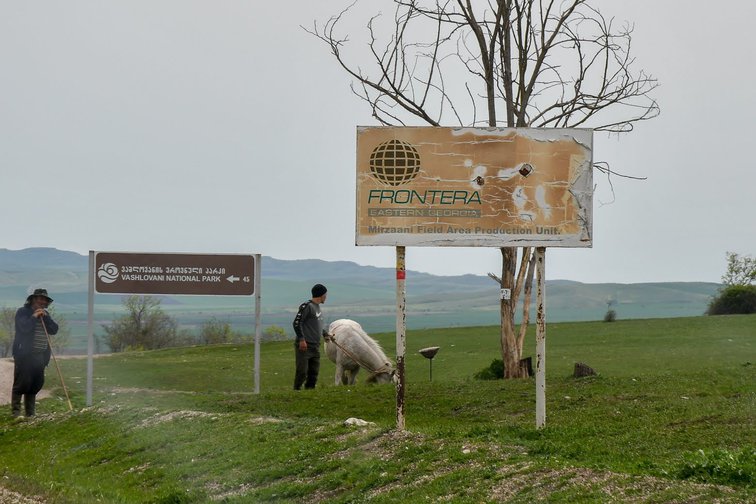 |
Thomas Rowley21 May 2021
AUS oil and gas company spent nearly $1m on lobbying as it attempted to sway an international arbitration case with Georgia, openDemocracy, OC Media and Sludge report today.
For years, Frontera Resources promised Georgia and other Black Sea states their “energy independence”.
The company was founded in 1997 by Bill White, a former US deputy secretary of energy, alongside the son of a former US treasury secretary and the son of the chairman of US oil giant Conoco. But since its beginnings in the post-Soviet ‘gold rush’ years, when Western companies sought new and cheap business opportunities abroad, Frontera has fallen on hard times.
In 2018, the Georgian state Oil and Gas Corporation (GOGC) took Frontera to international arbitration over breaches of its production-sharing contract. These contractual breaches included refusing to return a combined oil and gas exploration and production site, referred to as Block XII, after a key license expired, to GOGC. Previously, Frontera claimed it had identified 3.8 trillion cubic metres of gas in Block XII – which it described as a “historic new chapter in Georgia’s move towards energy independence”.
“A company from Texas, Frontera Resources has been drilling in Georgia for years and years and years. They’ve created great jobs in America, great jobs in Georgia. They’ve created freedom”
In response to the GOGC arbitration bid, Frontera sought to defend its use of the existing oil production site – and control over exploration territory – by mounting a public campaign over Block XII, employing lobbyists and using US congressmen to pressure the Georgian government into withdrawing their claims, according to lobbying records and internal management correspondence reviewed by the authors. The company did not respond to requests for comment.
One Frontera board member said that the GOGC arbitration – and Frontera’s potential loss of Block XII – was a move that could “ruin our company”, according to an internal email. Meanwhile, Frontera’s Georgian employees have lived for years without being paid wages they earned through work performed for the company, and some have fallen into poverty or worse.
Frontera’s lobbying campaign tied the company’s commercial interests to Georgia’s broader democratic crisis in the wake of the violent police dispersal of public protests in Tbilisi, the capital, in 2019, as well as the danger of Russian influence and other threats to foreign investors.
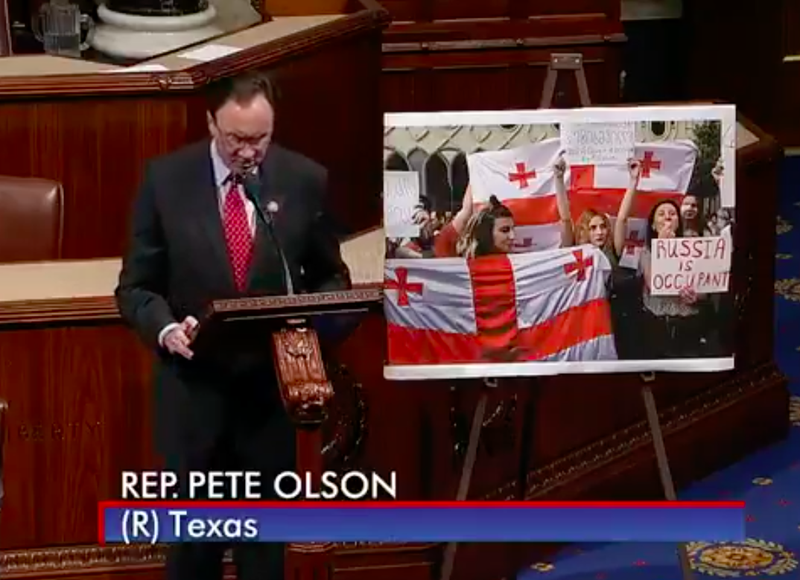
“Vladimir Putin’s puppet has attacked foreign investment in Georgia and crushed basic human rights,” Texas Republican congressman Pete Olson said from the floor of the US House of Representatives in January 2020 – referring to the current Georgian government’s oligarch backer Bidzina Ivanishvili.
Olson then named Frontera Resources, at the time a few months away from the final arbitration decision.
“A company from Texas, Frontera Resources has been drilling in Georgia for years and years and years. They’ve created great jobs in America, great jobs in Georgia. They’ve created freedom,” Olson continued, before connecting the US company’s contract dispute to Georgia’s broader democratic concerns.
“That was until the government took over all of their operations […] Now, they are drilling zero wells in Georgia,” Olson said. “Of course, the Napeolon of Siberia, Vladimir Putin, is happy to control Georgia’s oil.”
“The protesters in Georgia need our support,” he continued. “Join me in raising our voices for freedom in Georgia.”
Olson had previously received campaign donations from Frontera chairman Steve Nicandros, who gave a total of $5,200 to the Texas congressman in 2017-2018. Olson did not respond to request for comment. There is no suggestion of any link to the donation.
Political donations and lobbying
Records from the US Federal Election Commission (FEC) show that Nicandros (whose father was once chairman of Conoco and a friend of George Bush Sr.) spent $73,450 on political donations to 16 US congressmen and senators in 2017-2020. All 16 co-sponsored legislation that was lobbied for Frontera, made public statements to the Georgian and US authorities in the company’s defence or appear to have made private inquiries.
At the same time, the Texas-based company spent $890,000 on lobbying fees relating to its arbitration battle with Georgia in 2017–21. Lobbying disclosure filings state that the bulk of this – $850,000 – went to Washington government relations firm Cornerstone Government Affairs (CGA), for lobbying the US government on “Exploration and production matters in Eastern Europe”.
“A company that wants to talk about being mistreated in Georgia can find relatively receptive ears in Washington”
“The evidence appears to show that Frontera funded a lobbying campaign in Washington, aimed directly at getting the Georgian government to back off of its claims against the company,” said independent journalist Casey Michel, who has previously reported on foreign influence campaigns in the US.
CGA was contracted, according to official filings, to lobby on Frontera’s behalf members of the US House of Representatives and the Senate, as well as the US State Department and the Commerce Department. Cornerstone lobbyist Tyler Nelson, former chief of staff to Pete Olson, now sits on Frontera’s board as a non-executive director, according to recent US court filings. Neither CGA, nor Nelson responded to requests for comment.
“Georgia’s democratic backsliding over the past few years has clearly raised alarm bells across the West. But the fact that Frontera and its lobbyists would use that backsliding for their own ends is a new low,” Michel continued.

For Georgia, US support is vital in defending its interests against Russia, which backs the breakaway territories of Abkhazia and South Ossetia inside the country. In return, Washington, DC has served as the “second arena” of Georgian politics, where the country’s elite seeks influence over domestic rivals and foreign opponents.
“A company that wants to talk about being mistreated in Georgia can find relatively receptive ears in Washington,” said Lincoln Mitchell, adjunct senior research scholar at the Arnold A. Saltzman Institute of War and Peace Studies at Columbia University.
For the US establishment, “Georgian politics has largely been presented through the lens of [former president] Mikheil Saakashvili,” Mitchell noted.
While Saakashvili “presented Georgia to ‘the West’ as a trailblazer for democracy and ‘Western’ values in the post-Soviet space”, as a recent report put it, the former Georgian president has since cast the current Georgian Dream government, widely thought to be steered by Ivanishvili, as a pro-Russian political force damaging to the country’s pro-Western path.
“What is going on in Taribani [oil field], Tbilisi and Washington DC right now is our best chance to make money”
Aside from public statements, a Frontera management presentation from April 2018, released via US court filings, says CGA had secured letters from 20 congressmen to the Georgian prime minister and from four senators to US secretary of state Rex Tillerson in Frontera’s defence. These letters are not in the public domain, and the authors of this article were unable to obtain them.
The presentation also states that in 2017 and 2018 Frontera’s lobbyists CGA helped introduce draft legislation in the US House of Representatives in support of pressuring the Georgian government over the company’s arbitration dispute.
For example, in late October 2017 – three weeks before Frontera was supposed to transfer its oil and gas exploration territories back to GOGC under the terms of its contract – Frontera’s lobbyists at CGA helped get a resolution introduced in the House, as seen in the 2018 management presentation.
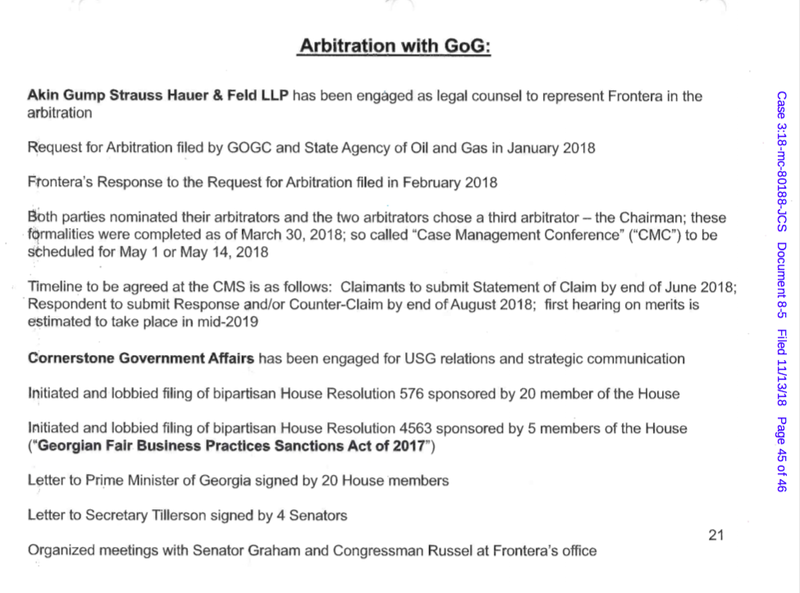
The resolution, introduced on 23 October by Texas congressman Ted Poe and co-sponsored by 20 US congressmen, “reaffirm[ed] U.S. support for the government of Georgia, its people, and its membership in NATO”.
But the resolution also called on the Georgian government to “enforce the rule of law with regard to adhering to contractual obligations” and “demonstrate its commitment to welcome and respect freely negotiated conditions of business investment” - clearly signalling that Georgia was at fault for the Frontera-GOGC contractual dispute.
Poe, who has since retired, received $3,700 in donations from Frontera’s Steve Nicandros in 2017, according to the FEC. There is no suggestion of any link between the donation and the resolution.
A couple of months later, on 6 December 2017 – some three weeks after Frontera refused to hand over the exploration territory according to its contract, thereby triggering arbitration proceedings with GOGC – Republican congressman Steve Russell proposed a “Georgian Fair Business Practices Sanctions Act”. This was a move lobbied on behalf of Frontera, according to the company’s 2018 management presentation.
This bill proposed that the US president regularly submit reports to Congress on “whether or not the government of Georgia is undermining commitments or contractual agreements made with U.S. business persons operating in Georgia”, and that Georgian state officials could be sanctioned if reports found to the contrary.
“When you are trying to solve a problem, you wind up with allies. And you also end up with enemies”
Russell received a $5,000 campaign donation from Nicandros in May 2018, according to the FEC. There is no suggestion of a link between the donation and the draft legislation. In 2018, he lost his seat in the US midterm elections.
“We certainly had some discussions together,” said Russell, regarding contact with Cornerstone over the Georgian Fair Business Practices Sanctions Act. “In terms of whether or not me and my integrity would be for sale for something so cheap, that’s not even open for discussion,” he said, when asked about the donation. “People will try to protect their interests. That’s kind of politics and foreign policy 101.”
“When you are trying to solve a problem, you wind up with allies. And you also end up with enemies,” said Russell, when asked about his support for Frontera. “We crossed paths [with Frontera] because of things that I was pursuing anyway. I was just concerned about what the implications were for NATO if we allowed a naive approach to eastern Europe. And that was really a lot of my motivation.”
Financial problems
Frontera’s public position on the arbitration was bullish. When the company announced the lawsuit in April 2018, it stated that the GOGC’s arbitration request was “without merit” – and that it was “confident of its standing and complete compliance with the [product-sharing contract]”.
Internally, however, management correspondence paints a dire financial picture of the company, which Frontera executive director Zaza Mamulaishvili described in a March 2018 email to the board as “produc[ing] less than $3m worth crude oil annually and losing money every month”.
Frontera also held considerable debt, Mamulaishvili said in the email, which made it a “very high risk” for possible investors – unless the company expanded operations and used its influence against the Georgian government.
“What is going on in Taribani [oil field], Tbilisi and Washington DC right now is our best chance to make money,” Mamulaishvili continued. “USG [US Government]’s continuous strong support,” he wrote to the Frontera board, together with “local influence”, would be key to the company pulling itself back from the brink.

In an email to the board a few weeks later, Frontera CEO Steve Nicandros noted that, together with CGA, he had invited Republican Senator Lindsay Graham for lunch at the company’s office in Houston, Texas, on 2 May 2018. Graham, Nicandros wrote, “has been and will be instrumental in providing leadership influence from the US Senate to push back on Georgia’s current initiative against us.”
“It would be very helpful if some or all of our board members were present to interact with [Graham] in a discussion [on] the importance of protecting our work in Georgia,” Nicandros continued, before stating he had also invited Steve Russell, the sponsor of the December 2017 “Georgian Fair Business Practices Sanctions Act”, for a separate lunch meeting.
Later that month, Steve Nicandros made a total of $10,000 in donations to a PAC that supports Graham, according to the FEC. Graham’s office did not respond to a request for comment. There is no suggestion of any wrongdoing.
In February 2019, Oklahoma Congressman Markwayne Mullin reintroduced the “Georgian Fair Business Practices Sanctions Act” to Congress with 11 co-sponsors, eight of whom received donations from Nicandros between 2017 and 2019.
For example, one of the co-sponsors for this bill, its preceding version and the 2017 resolution, Texas Republican Congressman Brian Babin, received a total of $3,000 in donations from Nicandros during 2018-2019. In September 2019, Nicandros made a $3,000 donation to Mullin’s election campaign.
Neither Babin, nor Mullin responded to requests for comment. There is no suggestion of any link between these donations and the draft legislation.
Political pressure
It was when the standoff between Frontera Resources and GOGC heated up in early 2020 that the US-Georgia special relationship became particularly evident. At the same time, other US Congressmen expressed concern over police violence in Georgia, and backtracking on democratic reform after a vote to introduce a proportional electoral system failed.
“There was a period in early 2020 where almost every week, there were some blackmail stories about Georgia in relation to Frontera, which suggested that the Georgian government ‘is acting against the Americans’ [or] ‘the country is going backward in its democracy’,” said economist Vakhtang Charaia, director of the Ivane Javakhishvili Tbilisi State University Center for Analysis and Forecasting, referring to near-identical open letters in Frontera’s defence sent to US Secretary of State Mike Pompeo by Markwayne Mullin, Randy Weber and Brian Babin.
These letters, Charaia noted, were widely picked up in the Georgian media in January and February 2020, alongside another statement by US politicians, which expressed concerns that Georgia was not meeting its reform targets.
“Frontera’s campaign was damaging for the Georgian government – not only politically in terms of external relations, but domestically, too,” said Charaia. “It doesn’t matter whether these messages come officially from the US administration or from a congressman or a lobbying company, in Georgia, it’s still negative noise.”
“It doesn’t matter whether these messages come officially from the US administration or from a congressman or a lobbying company, in Georgia, it’s still negative noise”
“In the past eight years, the Georgian Dream government has made life very difficult for foreign investors in Georgia,” said Fady Asly, chairman of the board at the International Chamber of Commerce in Georgia.
In recent years, for example, a high-profile project with US funds for a new deep sea port at Anaklia, on the Black Sea, has gone to international arbitration with Georgia.
“There were a number of cases of harassment of foreign investors, and Frontera came in their wake,” Asly said. “And so the timing was good for presenting themselves as victims – whether they were or not, I don’t know.”
“I believe that these statements by US Congressmen were the result of misinterpretation and distortion of the facts by Frontera,” said Vazha Khidasheli, legal and policy adviser to GOGC, and chairman of the corporation’s supervisory board. “Otherwise I could not suspect that such high-level representatives of the US establishment could support this.”
In the end, it appears that Frontera’s campaign had little effect on the final arbitration decision, although it continued to put pressure on the Georgian government.
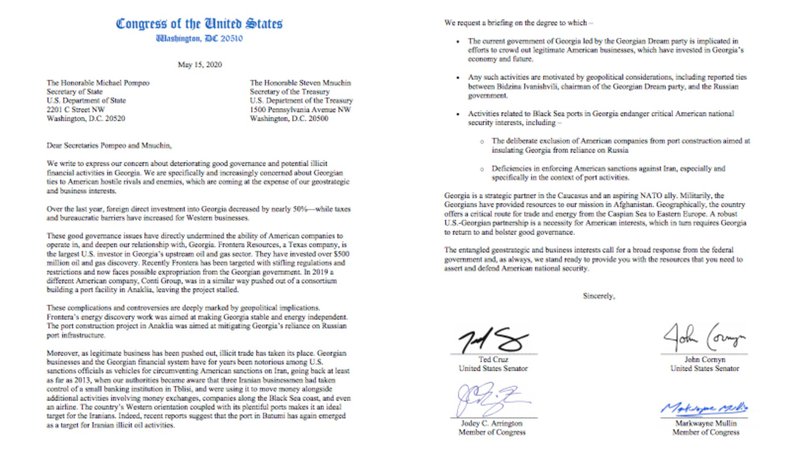
In April 2020, the GOGC announced that it had won the majority of its claims, and terminated Frontera’s contract. Frontera contested this interpretation of the final arbitration, claiming the government’s statements had “purposefully misled and distract[ed] from the actual results of the arbitration court’s ruling”, and that the company was “pleased” with the final results. According to GOGC, the arbitration award remains confidential because Frontera has not given its consent to publish it.
Several weeks after the final arbitration decision was announced in April 2020, US Senators Ted Cruz and John Cornyn, as well as Congressmen Markwayne Mullin and Jodey C. Arrington, wrote to Secretary of State Mike Pompeo, claiming that Frontera “face[d] possible expropriation from the Georgian government”.
Arrington received $3,000 in donations from Nicandros in February 2020; Cornyn had previously received $2,850 in 2018-2019. Neither Arrington, nor Cornyn responded to requests for comment. There is no suggestion of any link between these donations and the letter.
“The Georgian government and GOGC decided expressly not to hinder Frontera’s operation in Georgia in any way during the arbitration,” said GOGC’s Khidasheli, citing the company’s “aggressive lobbying campaign” as one of the reasons the GOGC did not attempt to tackle apparent environmental damage at the Frontera site.
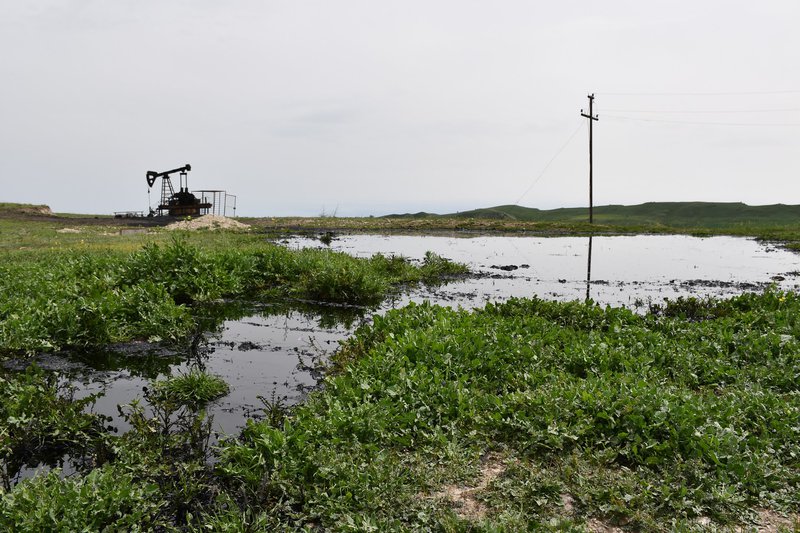
In July, Mullin published an op-ed in The Hill, where he once again accused the Georgian government of expropriating Frontera’s business, provoking Georgian Foreign Minister David Zalkaliani to call the US congressman a “Frontera lobbyist”.
Later that month, the Georgian government suspended its termination of Frontera’s contract, and returned the existing oil production site to the company’s control. This “goodwill gesture”, GOGC's Khidasheli said, was “to avoid a potential threat to the US-Georgia strategic partnership and Georgia’s image as an investment friendly country,” and came after “Frontera instigated criticism from the US”.
“We wish to once again be clear that no legal basis has ever existed for the unilateral cancellation of our contract,” Frontera said at the time. “The government of Georgia’s continued insinuation to the contrary is wrong and amounts to intentional harassment.”
According to Charai, “after this decision [to return the production site], the negative press stopped.”
“What does America have to do with paying overdue salaries?”
While Frontera and its chairman Steve Nicandros spent thousands of dollars on lobbying and political donations since 2017, the company’s Georgian employees have been left without wages and jobs. Shareholders have effectively lost their investments.
Frontera was originally listed on London’s Alternative Investment Market (AIM) – which has a reputation for light-touch regulation – in 2005, when it raised $88m for exploration activities. Thirteen years after its original listing, amid debt difficulties and ongoing legal battles with creditors, the company automatically delisted from AIM in December 2018, after their nominated adviser Cairn Financial Advisers resigned.
With the company delisted, Frontera shareholders lost out – although they still own their shares, the shares can no longer be traded, and have lost nearly all their value. The company’s requirements to keep shareholders informed, previously regulated by AIM, are now minimal, as it is a private company. AIM, however, still has jurisdiction regarding investigation and disciplinary action over the company, according to its official rules.
Alan Hall, a Frontera shareholder, said that private investors, of which there are thought to be 200-300 in the UK, have “been held incommunicado for nearly 30 months” since the company delisted. “We are very pissed off at the lack of communication, disingenuous statements and over three years of bullshit,” Hall said.
“We are self-respecting people, we can work. I want the government to get our jobs back and we’ll be able to provide for our families [. . .] I don’t want to beg for help instead”
In Georgia itself, Frontera’s now former employees, based in the country’s east, have sued the company over unpaid salaries. A total of 85 workers claim that the company failed to regularly pay them monthly salaries from December 2016 onwards. By November 2019, the employees said, Frontera owed them 11 months of backpay, in addition to two months for termination without notice, as Georgia’s labour law stipulates.
A month after workers filed their lawsuit, Frontera responded by firing over 100 employees, including all the plaintiffs, and counter-suing six claimants for hindering oil extraction, allegedly incurring damages worth nearly $7,000.
Speaking in late April 2021, several former Frontera employees complained that the issue of the company operating in Georgia and its conflict with the Georgian government had become unfairly “politicised” and falsely portrayed as “anti-American”.
“What does America have to do with paying overdue salaries?” asked Nodar Tskhvediashvili, a former oil extraction operator with 20 years of experience.
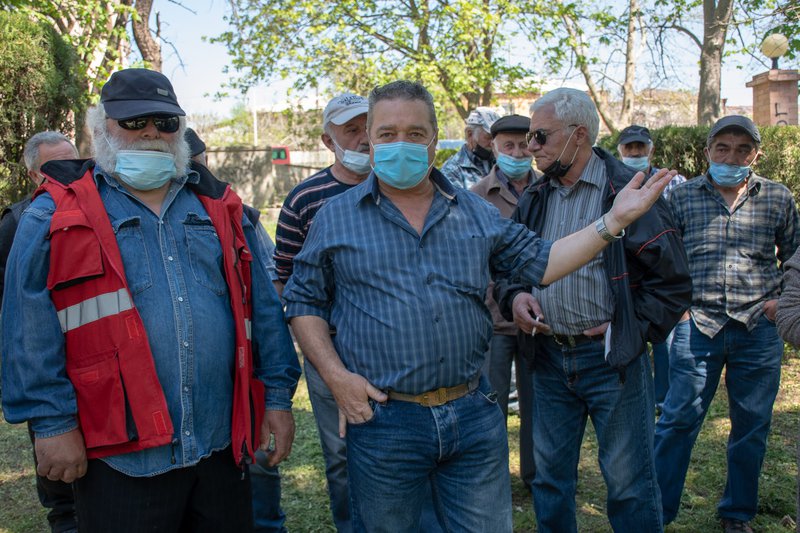
“We live on the edge of Georgia. There is no transit or anything here to create jobs, these [jobs] were the main [source of employment] for us,” said former Frontera eemployee Maro Kochiashvili.
Frontera’s laid-off employees have received an annual payment of $348 in government assistance twice since the coronavirus pandemic hit.
“We are self-respecting people, we can work. I want the government to get our jobs back and we’ll be able to provide for our families [. . .] I don’t want to beg for help instead,” one former Frontera worker said.
Two of the 85 workers have died since the lawsuit, which has still not been heard in court, was filed in 2019.
Zaza Tsiklauri, a former borehole tester and operator at Frontera, died of brain cancer while waiting for his back pay, which he needed to pay for urgent treatment.
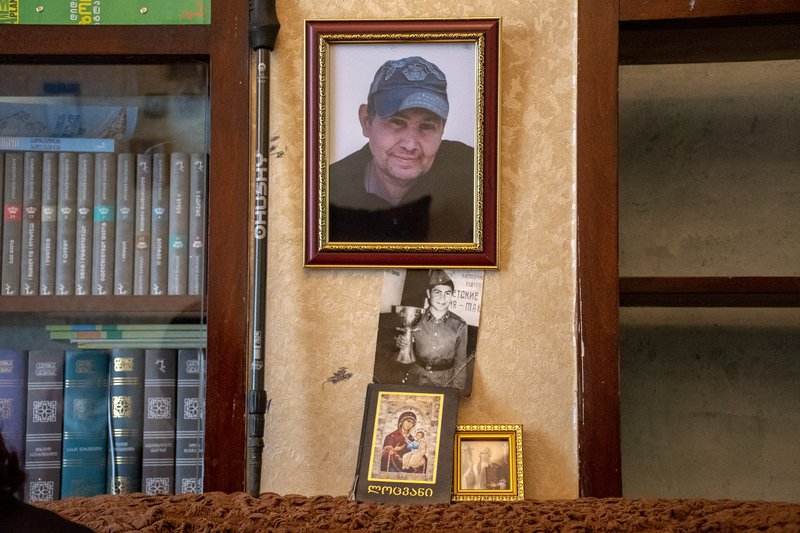
Tsiklauri’s widow Pati Arabuli said that due to her husband’s health condition “he could not afford to stop taking medication” – but could not afford his medicine while his monthly salary of $340 remained unpaid.
“I’m not blaming anyone for his death, but it [his salary] could have extended his life,” Arabuli said.
Another Frontera worker, Avtandil Onanashvili, 53, took his own life last summer after the loss of his job led to the break-up of his marriage and a descent into poverty, his colleagues said.
“How can no one realise that the miserable statements like those made about Frontera both cause anti-Western sentiments and kill our citizens?” Irakli Petriashvili, Chairman of the Georgian Trade Union Federation (GTUC), asked rhetorically after Onanashvili’s death, referring to what he saw as the Georgian authorities’ soft position towards Frontera resources.


No comments:
Post a Comment
Note: only a member of this blog may post a comment.